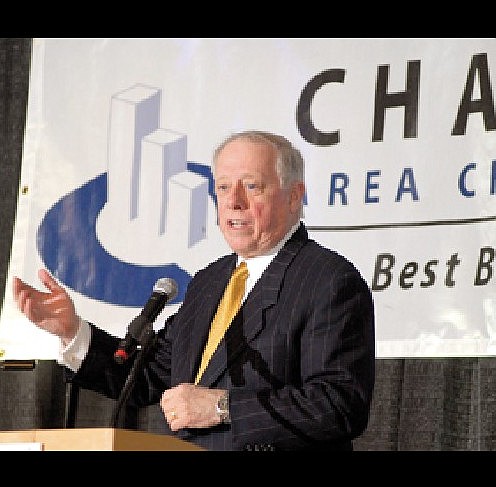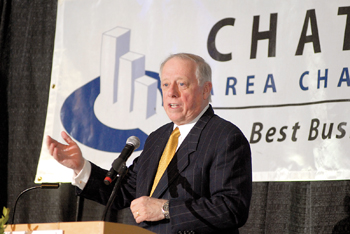As former Tennessee Gov. Phil Bredesen took the stage at The Chattanoogan hotel to address a room full of doctors Wednesday night, he began by saying that since the time mankind lived in caves, healers have been among the most honored people in society.
"I want to say that at the outset," said Bredesen, "because you are about to hear me be very critical of some of things in the health care system we have today."
Bredesen, who before his governorship was the founder of health care management company HealthAmerica Corp., spoke at the University of Tennessee College of Medicine Chattanooga's Internal Medicine Update.
Held on the one-year anniversary of the implementation of the Affordable Care Act, the evening's talks focused on evolving health care policy.
Bredesen said the new law does not get to the root of the unwieldy problems of the American health care system, which, he charged, is the most expensive in the world while its quality remains average or inferior to other comparable nations.
Instead, the law "doubles down" on a massively wasteful system that needs substantial overhaul.
If you took America's current health insurance model and applied it to homeowner's insurance, he said, damage repair would look like a bunch of disconnected construction: No general contractor, no building codes and with each worker spending money on whatever materials he thought necessary on the expectation that insurance would pay for it.
More standardized measures of quality care are essential to improve medical performance, he argued. And without more tension between buyer and seller in the health care market, health costs will only continue to skyrocket, he said.
Also speaking at the event was David Merritt, the managing director for communications firm Luntz Global Partners, who served as health policy adviser to the presidential campaigns of former House speaker Newt Gingrich, Sen. Fred Thompson and Sen. John McCain.
While the nation is a year into health reform, Merritt said, there are still "an enormous amount of uncertainty" that will determine how the law plays out: Whether premiums will rise or fall; how businesses change their stance on employee coverage; which states will expand Medicaid; and how the law will factor into the November elections.
Looming in the future, Merritt argued, is an "entitlement cliff" where skyrocketing costs of federally-funded programs like Medicare and Medicaid will become untenable.
Contact staff writer Kate Harrison Belz kbelz@timesfreepress.com or 423-757-6673.

